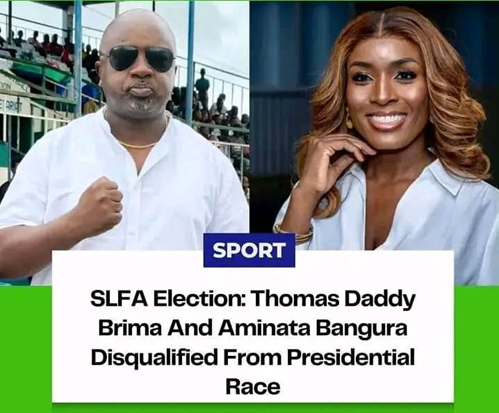SPECIAL COMMENTARY
As the Sierra Leone Football Association (SLFA) prepares for its crucial Elective Congress on August 2nd, 2025, controversy looms large over the disqualification of two high-profile presidential aspirants—Thomas Daddy Brima and Aminata Bangura. Disqualified by the SLFA Ethics Board after failing integrity checks, both individuals have challenged the decision in court, with reports confirming that Ms. Bangura has even taken the matter to the Court of Arbitration for Sport (CAS) in Switzerland.
While it is within their legal rights to seek redress, the actions of the disqualified candidates have raised critical questions about transparency, accountability, and their motives for pursuing legal battles instead of engaging with the reasons behind their disqualifications.
The SLFA Ethics Board, elected in April 2025, was mandated to rigorously vet all candidates in accordance with the SLFA Constitution and FIFA’s Code of Ethics. It found credible grounds—including alleged falsification of documents and irregularities in police clearance certificates—to disqualify Brima and Bangura. The Board’s decision, far from being arbitrary, appears to reflect a strong commitment to reforming the governance of Sierra Leonean football.
However, by rushing to the courts and to CAS, the disqualified aspirants appear to be challenging not just the verdict but the very credibility of the Ethics Board itself. Implicit in their actions is the suggestion that the Board lacks sufficient evidence and may have acted unfairly or with bias.
Yet, the central question that many football stakeholders and concerned Sierra Leoneans are asking remains: Why would the Ethics Board risk discrediting itself and the integrity of the entire electoral process without solid proof?
In a sport already under intense scrutiny for governance lapses, the SLFA’s efforts to enforce ethical standards must be applauded, not obstructed. If Thomas Daddy Brima and Aminata Bangura believe the allegations are baseless, the public deserves clarity. It is not enough to launch legal counterattacks without addressing the reasons behind the disqualification. The football community needs either a convincing rebuttal of the charges or an honest admission of fault.
The right course of action for both aspirants would be to come clean. If they believe the Ethics Board erred, they should present their case openly, with evidence. If the allegations are indeed true, then accepting the outcome with humility and apologizing to the football family would show maturity and a genuine commitment to the development of the sport.
Seeking court injunctions to delay or derail the Elective Congress not only disrupts the democratic process but also threatens to stall football progress in Sierra Leone. The entire football ecosystem—players, coaches, fans, and administrators—is counting on credible leadership and a peaceful electoral process to take the sport forward.
It is hoped that both the High Court and CAS will consider the broader implications of their decisions. The growth and governance of football must not be held hostage to individual ambitions, especially when those ambitions are clouded by serious integrity concerns.
For the sake of the game, the country, and the young talents looking up to football for opportunity, it’s time for honesty, accountability, and unity. The football family deserves nothing less.



